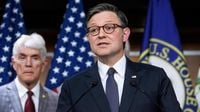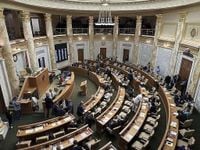With the clock ticking down to midnight on October 1, 2025, the United States stands at the edge of yet another federal government shutdown. Despite repeated warnings from industry leaders and mounting public anxiety, political divisions in Washington have left Congress in a stalemate, threatening to bring government operations—and a critical sector of the American economy—to a grinding halt.
On September 29, 2025, the National Business Aviation Association (NBAA) joined 49 other aviation stakeholders, unions, and trade groups in an urgent appeal to Congressional leaders. Their letter, addressed to House Speaker Mike Johnson (R-La.), Minority Leader Hakeem Jeffries (D-N.Y.), Senate Minority Leader Chuck Schumer (D-N.Y.), and Majority Leader Mitch McConnell (R-Ky.), called for a bipartisan compromise to avert the looming shutdown. The message could not have been clearer: "Government shutdowns harm the U.S. economy and degrade the redundancies and margins of safety that our National Airspace System (NAS) is built upon," the letter stated, as reported by the NBAA.
The aviation sector, a backbone of American commerce and connectivity, finds itself particularly vulnerable. According to the NBAA, the industry contributes more than 5% to the nation's gross domestic product, accounting for a staggering $1.37 trillion in 2023 and supporting over 10 million jobs. The letter warned that a shutdown would halt hiring and training for air traffic controllers and technicians, suspend crucial system upgrades, and stall maintenance of critical air traffic control equipment and infrastructure. In essence, the safety and efficiency of the entire U.S. airspace could be compromised overnight.
The NBAA and its coalition partners did not mince words about the potential fallout. "A government shutdown at this stage would jeopardize the important progress that we all have made on these efforts thus far," the letter continued, referencing recent initiatives to modernize air traffic control and accelerate hiring at the Federal Aviation Administration (FAA). The coalition concluded, "Congress must work quickly to avoid another harmful shutdown. The FAA, its dedicated frontline workforce, our aviation community, our economy and the American public cannot afford a disruption, regardless of how long it lasts."
Yet, even as the aviation industry sounded the alarm, political leaders in Washington appeared locked in a game of brinkmanship. On Monday, September 29, House Republican leaders held a conference call to rally their members ahead of the shutdown deadline. Speaker Mike Johnson canceled scheduled voting days for September 29 and 30, with no plans to return lawmakers to Washington until the following week—even as the shutdown loomed just days away, according to The Hill.
The Republican strategy, as described by multiple sources on the call, is to pressure Senate Democrats into accepting a "clean" short-term continuing resolution to keep the government funded. The House had already passed a GOP-crafted stopgap bill earlier in September, designed to fund the government through November 21, 2025. However, the Senate promptly rejected it, citing Democratic concerns—particularly over health care issues such as expiring Affordable Care Act subsidies.
"Realistically, the way [Democrats have] painted themselves into a corner, I don't think they'll be willing to yield. There's going to be some shutdown at least on October 1st, for a few days at least," Johnson reportedly told his colleagues, as Fox News Digital learned. He urged Republicans to "stay completely united" and keep a low profile until their return to Capitol Hill, even advising members to forgo public speeches and political events for the time being.
House Majority Whip Tom Emmer (R-Minn.) echoed this sentiment, emphasizing the importance of keeping the party's messaging focused. "If you want to win the shutdown, we have to stay on offense," he said, according to Fox News Digital. "We need to keep emphasizing that. And if we do, we're going to win this battle." House GOP Conference Chair Lisa McClain (R-Mich.) urged colleagues to avoid getting drawn into debates over healthcare, insisting the focus should remain squarely on federal funding.
On the other side of the aisle, Democrats have been equally resolute. Senate Minority Leader Chuck Schumer has defended his party's approach, insisting that any funding bill must address key health care concerns—including reversing some Medicaid cuts and extending COVID-19 pandemic-era Obamacare subsidies. Republicans, in turn, have accused Democrats of making unreasonable demands, claiming these measures would add about $1.5 trillion in spending.
The partisan standoff has only deepened with time. Democrats have criticized Republicans for canceling votes ahead of the deadline, arguing that lawmakers should be in Washington working to resolve the crisis. House Democrats convened a meeting in the Capitol on Monday evening, despite the canceled votes, signaling their commitment to finding a solution. Meanwhile, the GOP has maintained that it has already "done its job" by passing the stopgap bill and sees little reason to reconvene before next week.
According to The Hill, unless a last-minute breakthrough occurs during a planned White House meeting with President Donald Trump and top congressional leaders, a government shutdown is all but certain. Should the shutdown take place, House and Senate Republican leaders are expected to hold a joint press conference on Wednesday, October 1.
The stakes are high, not just for the political fortunes of those on Capitol Hill, but for millions of Americans whose livelihoods and safety could be affected. The aviation sector, as highlighted by the NBAA, is a prime example of the broader economic risks at play. Furloughs of FAA employees, suspension of hiring and training, and delays in critical system upgrades could ripple throughout the industry, impacting everything from business travel to cargo shipments to emergency medical flights.
Historically, government shutdowns have proven costly and disruptive. According to the NBAA and its coalition partners, previous shutdowns have "severely hindered" economic activity, with far-reaching consequences for both the public and private sectors. The current impasse threatens to repeat that pattern, with no clear path to resolution in sight.
As the deadline approaches, the message from stakeholders outside the political arena is unambiguous: the time for partisan gamesmanship has passed. The NBAA and its allies have urged Congress to put aside differences and act in the national interest. Whether that call will be heeded remains to be seen, but for now, the nation waits—watching and hoping that compromise will prevail before the clock strikes midnight.


